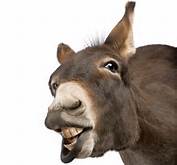
“Ma asiti l’kha-
“What have I done to you?”
In Parshat Balak, the king of Moav, whose name is Balak, becomes frightened of all these Israelites who are camping in a nearby valley. So, he sends messengers out to the mysterious, reclusive sorcerer Bilam to request that he put a curse on the Israelites. At first, Bilam refuses. But after several requests, he concedes and rides out on his donkey. Next, there’s a strange and unique passage- one of only two instances in the Torah of talking animals. (The other one is the talking snake in the Garden of Eden).
In this passage, Bilam rides out on his donkey through a vineyard, when suddenly an angel appears and blocks his path with sword drawn. But, only the donkey can see the angel; Bilam is oblivious to it. The donkey veers off the path to avoid the sword-wielding angel, and accidentally presses Bilam’s foot into a wall. Bilam gets angry and hits donkey with a stick, at which point the animal opens her mouth and speaks: “Ma asiti l’kha- “What have I done to you?” Bilam yells back- “Because you mocked me! If I had a sword I’d kill you right now!” Says the donkey: “Am I not your donkey that you’ve ridden until this day? Have I ever done anything like this before?” “No,” says Bilam. Suddenly, Bilam’s eyes are magically “uncovered” and he too sees the angel with the sword. Bilam bows, apologizes and offers to turn back. The angel tells him not to turn back, but he should be careful only say the words that the Divine will place in his mouth to say. So, Bilam goes on his way, and meets up with King Balak, who pleads with Bilam to curse the Israelites. But, every time Bilam opens his mouth, he pronounces blessings instead. King Balak tries again and again to get Bilam to curse, bringing him to different places on a mountain overlooking the Israelite camp, as if that would change something. But every time, it just comes out more blessings. In Bilam’s final blessing, he says, “The words of Bilam son of Beor, the words of the man with an open eye, the words of the one who hears the sayings of God, who sees the vision of Shaddai, while fallen and with uncovered eyes- “Mah tovu ohalekha Yaakov, mishkenotekha Yisrael- “How wonderful are your tents, O Jacob, your dwelling places O Israel…” -and the blessings flow on from there. So what’s going on here? Why is it that Bilam’s donkey perceives the angel before he does, and why do his eyes become “uncovered” as a result of the donkey speaking to him? And, once his eyes are uncovered, how does that allow him to “hear” the Divine voice, transforming curses into blessings? One way to grasp this passage is to understand that the donkey is your own body. There’s a tendency to take the body for granted, as if it’s just a vehicle to achieve your intentions- like a car, or a donkey that you ride on. But the spiritual potential of your body is to be a temple of Presence – a vessel for the light of your awareness. So at first, Bilam is just hitting his donkey, trying to control it. That’s the ego- selfish, angry, and entitled. But when he starts listening to what the donkey is telling him, then suddenly he can see the angel and hear it speak. Meaning, when you become present with your body, anchoring your awareness in your breathing, then you can clearly see the nature of your impulses that arise, and hear the “angels of your better nature” so to speak. So rather than simply being taken over by yoru impulses, there’s space to really see which which ones are blessings and which are curses. That’s the “uncovering of the eyes” so to speak. There’s an impulse of anger, or an urge to put someone down- you can see that clearly and not be taken over by it. Or, there’s an impulse of love, of supportiveness, of listening- that’s a blessing, and you can choose that. That’s the Yes and the No of being conscious. There’s a story that when Reb Yosef Yitzhak of Lubavitch was four years old, he asked his father, Reb Shalom Ber: “Abba, why do we have two eyes, but only one mouth and one nose?” “Do you know your Hebrew letters?” asked Reb Shalom Ber. “Yes,” replied the boy. “And what is the difference between the letter shin and the letter sin?” continued Reb Shalom. “A shin has a dot on the right side, and the sin on the left.” “Right! Now, the letter shin represents fire, and fire makes the light that we see by. The dots on the right and left are like your two eyes. “Accordingly, fire has two opposite qualities. On one hand, it can give us life by keeping us warm and cooking our food; that’s the right dot. On the other hand, it can burn us; that’s the left dot. “Similarly, there are things you should look at with your right eye, and things you should look at with your left eye. You should see others with your right eye, being warm and loving, but see candy with your left eye, not being taken over by that urge to grab at it!” So on this Shabbat Balak, the Sabbath of Seeing, may we return our awareness ever more deeply into our bodies so that can see clearly the nature of our impulses and hear the “angels of our better nature” so that we can choose paths of blessing and peace. Good Shabbos!
1 Comment
Jorge González
7/7/2017 08:19:41 am
Toda Rabah Rabbi, what a wonderful Dashas. Without a doubt, we will be blessed by this Parasha.
Reply
Leave a Reply. |
Archives
July 2024
|
 RSS Feed
RSS Feed